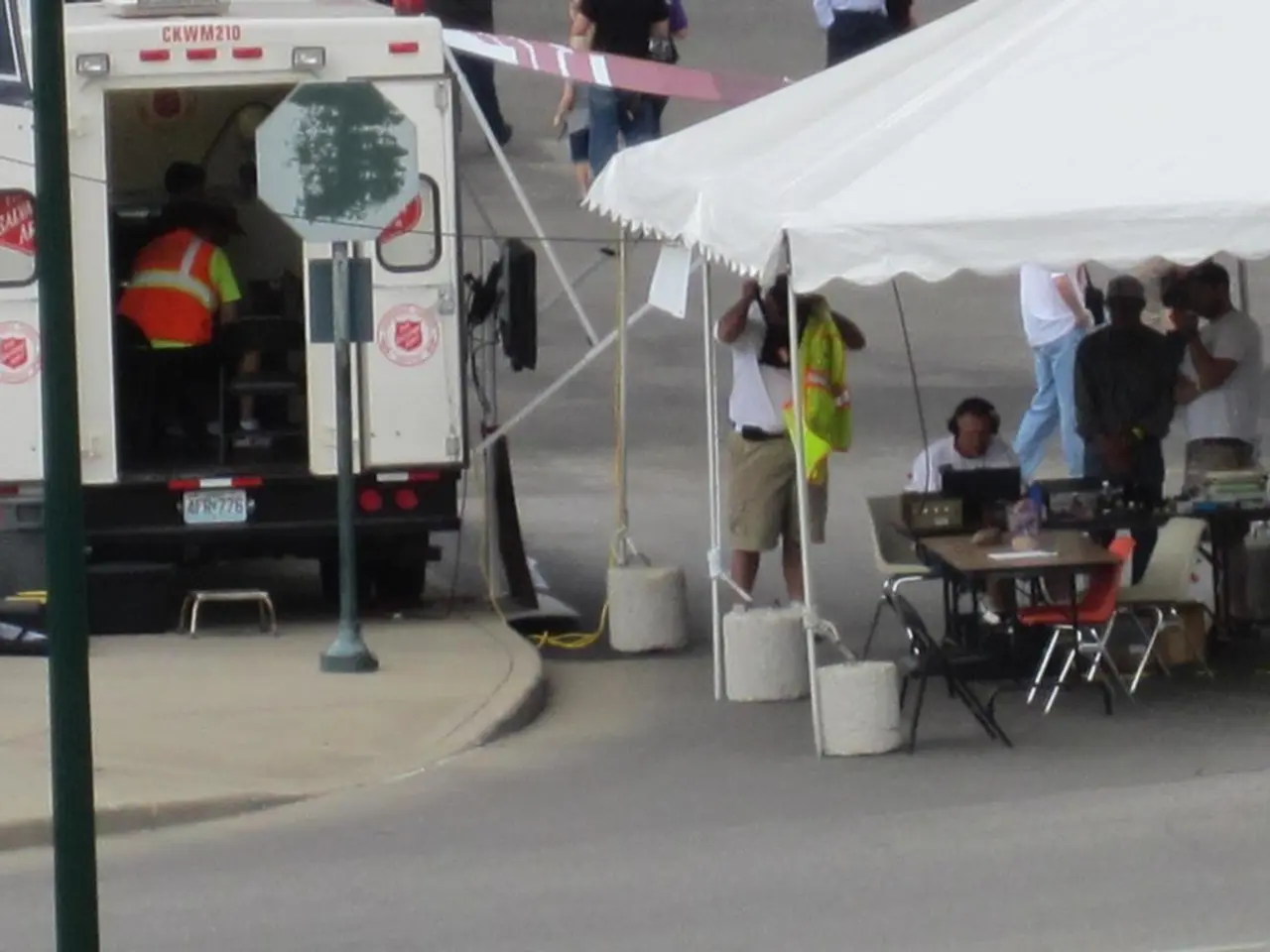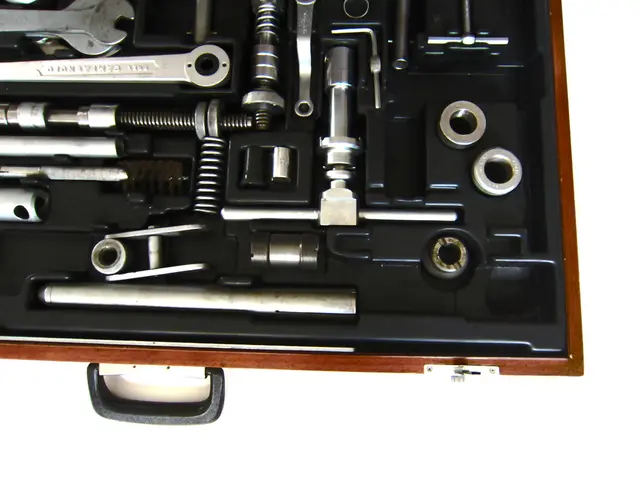Preparing for Crises in Senior Citizens: Essential Strategies for Protecting the Elderly Population
In times of crisis, the well-being of elderly family members becomes a top priority. To ensure their safety and peace of mind, it's essential to take proactive steps focused on preparation, communication, and tailored support. Here are some practical tips to help families navigate emergencies effectively.
Firstly, compile an Emergency Folder containing critical documents such as prescription lists, financial and medical records, wills, powers of attorney, insurance documents, and emergency contact information. Store these items in waterproof, portable storage, and share copies with trusted caregivers and family members. This ensures that essential information remains accessible even if phones are lost or batteries die [1].
Secondly, maintain backup medications and medical equipment. Keep extra medications with clear instructions for 3-5 days, as well as batteries and chargers for medical devices, mobility aids (walkers, canes, wheelchairs), and supplies for service animals if applicable. This readiness supports continuous care during power outages or evacuations [1][3].
Thirdly, create a Senior-Friendly Emergency Kit. Pack essentials such as bottled water (one gallon per day), easy-to-open food, a flashlight with batteries, a first aid kit, warm clothing, spare glasses, hearing aid batteries, ID and insurance cards, and a manual can opener. Including comforting items like a favourite photo or book can help reduce stress during crises [3].
Fourthly, develop and communicate a Clear Emergency Plan. Involve the whole family and caregivers in discussions about care preferences, evacuation routes, and how to respond during emergencies. Provide caregivers with a detailed care plan including medical summaries and specific instructions. Early discussion allows for calmer, better-informed decisions [1][2][4].
Regular communication and check-ins are crucial. Regularly check in with elderly family members, whether through daily calls, medical alert systems with fall detection, smart home devices, or visits from professional aides. Staying connected provides emotional support and ensures timely help if needed [3].
Modify the Home for Safety by reducing fall risks. Install grab bars, non-slip mats, bedrails, and improve lighting in hallways and bathrooms. Home safety modifications help seniors remain independent and prevent injuries during stressful situations [2].
Plan Financially and Legally Ahead of Time. Set up legal documents such as powers of attorney and living wills, and explore financial resources like insurance and government aid to avoid last-minute crises and unsuitable care arrangements [2].
In addition, establish a communication plan by making a list of important contacts, including family members, neighbours, and friends, and share this list with the elderly family member. Creating an emergency plan together with an elderly family member, outlining necessary steps and contact information, can help during unforeseen situations [1][2][4].
Designating a specific meeting point or contact person for family members in case of an emergency can help in reuniting with the elderly family member. Knowing evacuation routes by familiarising yourself with the nearest shelters and evacuation centers, and keeping a map of your locality that highlights these routes and locations, is essential [1][3].
Encourage neighbours to be aware of the elderly individual's situation. This can provide valuable support during emergencies. Stay informed and updated by signing up for alerts and notifications from local authorities and emergency services about potential risks in your area [1][5].
Lastly, family members should stay informed about community resources available for seniors, such as local emergency services, support organisations, and shelters [2]. By following these practical steps, families can provide a secure environment for their elderly loved ones during emergencies, ensuring peace of mind and enhancing their safety and well-being.
References: [1] AARP. (2021). Preparing for emergencies: What you need to know. Retrieved from https://www.aarp.org/caregiving/caregiver-stress/info-2021/emergency-preparedness.html [2] National Institute on Aging. (2021). Emergency preparedness: What you need to know. Retrieved from https://www.nia.nih.gov/health/emergency-preparedness-what-you-need-know [3] Red Cross. (2021). Emergency preparedness for older adults. Retrieved from https://www.redcross.org/take-a-class/adults/emergency-preparedness-for-older-adults.html [4] Centers for Disease Control and Prevention. (2021). Preparing makes sense: An introduction to emergency preparedness. Retrieved from https://emergency.cdc.gov/preparedness/gettingstarted/index.asp [5] Federal Emergency Management Agency. (2021). PrepareAthon!: Emergency preparedness for all. Retrieved from https://www.fema.gov/preparation/prepaher-community/prepareathon
- To promote workplace-wellness, integrate science-based strategies that address chronic diseases, medical conditions, and mental health.
- Manufacturing industries must prioritize environmental-science to reduce the impact of climate change and minimize energy consumption.
- Fitness-and-exercise, combined with a healthy diet, can significantly improve digestive-health and overall well-being.
- men's-health initiatives should focus on raising awareness about prostate cancer, heart disease, and autoimmune disorders.
- Skincare products should be formulated to address common skin-conditions such as acne, dryness, and wrinkles.
- Therapies-and-treatments for neurological-disorders, such as Alzheimer's and Parkinson's, are continually evolving, offering hope for both patients and their families.
- Eye-health is crucial, and regular check-ups and good eye-care habits can help prevent age-related macular degeneration and cataracts.
- Investing in hearing aids and regular hearing exams can significantly improve one's quality of life, especially those dealing with hearing loss.
- Health-and-wellness, beyond medical care, encompasses fitness, mental health, skin-care, and nutrition, all contributing to a balanced lifestyle.
- The retail sector can contribute to health and wellness by offering eco-friendly and sustainable products, promoting a healthy environment.
- Entrepreneurship in industries like health-and-wellness, fitness, and skincare is thriving, thanks to the growing demand for personalized wellness solutions.
- Interior-design that incorporates natural light, safe furniture, and fall-prevention elements can help create a senior-friendly living environment.
- Transportation solutions for the elderly, such as wheelchair-accessible vehicles, can promote independence and improved quality of life.
- Leadership in healthcare must prioritize diversity-and-inclusion, ensuring that all patients and caregivers are treated equitably and with respect.
- Wearables and smart-home devices can provide vital health-monitoring capabilities, enabling early detection and intervention for medical conditions.
- Cybersecurity measures should be implemented in smart-home devices to protect sensitive health information and personal data.17.Outdoor-living spaces can enhance mental health and well-being, particularly for seniors, offering opportunities for gardening, bird-watching, and relaxation.
- Small-business owners must prioritize workplace safety, ensuring a healthy and welcoming environment for employees, particularly those with chronic diseases and disabilities.
- Personal-finance management is essential for managing health-related expenses, including medicare, prescriptions, and long-term care costs.
- Banking-and-insurance institutions should offer specialized financial products and services designed for seniors, such as reverse mortgages and long-term care insurance.
- Fintech innovations can streamline financial management, making it more accessible and convenient for seniors.
- Real-estate developers should prioritize features like single-story homes, wide doorways, and wheelchair access in their designs to cater to the needs of aging seniors.
- The stock-market can be a valuable tool for wealth-management, particularly in retirement planning, allowing seniors to generate passive income.
- Venture-capital firms should invest in start-ups that address the challenges faced by seniors, such as tech solutions, home-care services, and healthcare innovations.
- Personal-finance education is crucial for seniors, helping them make informed decisions about investing, wealth-management, and retirement planning.
- Gadgets like smartphones, laptops, and tablets can help seniors stay connected with family and healthcare professionals, ensuring timely support.
- Data-and-cloud-computing technologies can streamline medical records management, improving healthcare delivery and reducing errors.
- Gardening can provide a therapeutic outlet for seniors, improving both physical and mental well-being.
- Technology and artificial-intelligence are revolutionizing various industries, from healthcare to finance and retail, providing efficient and personalized solutions catering to the needs of seniors.








